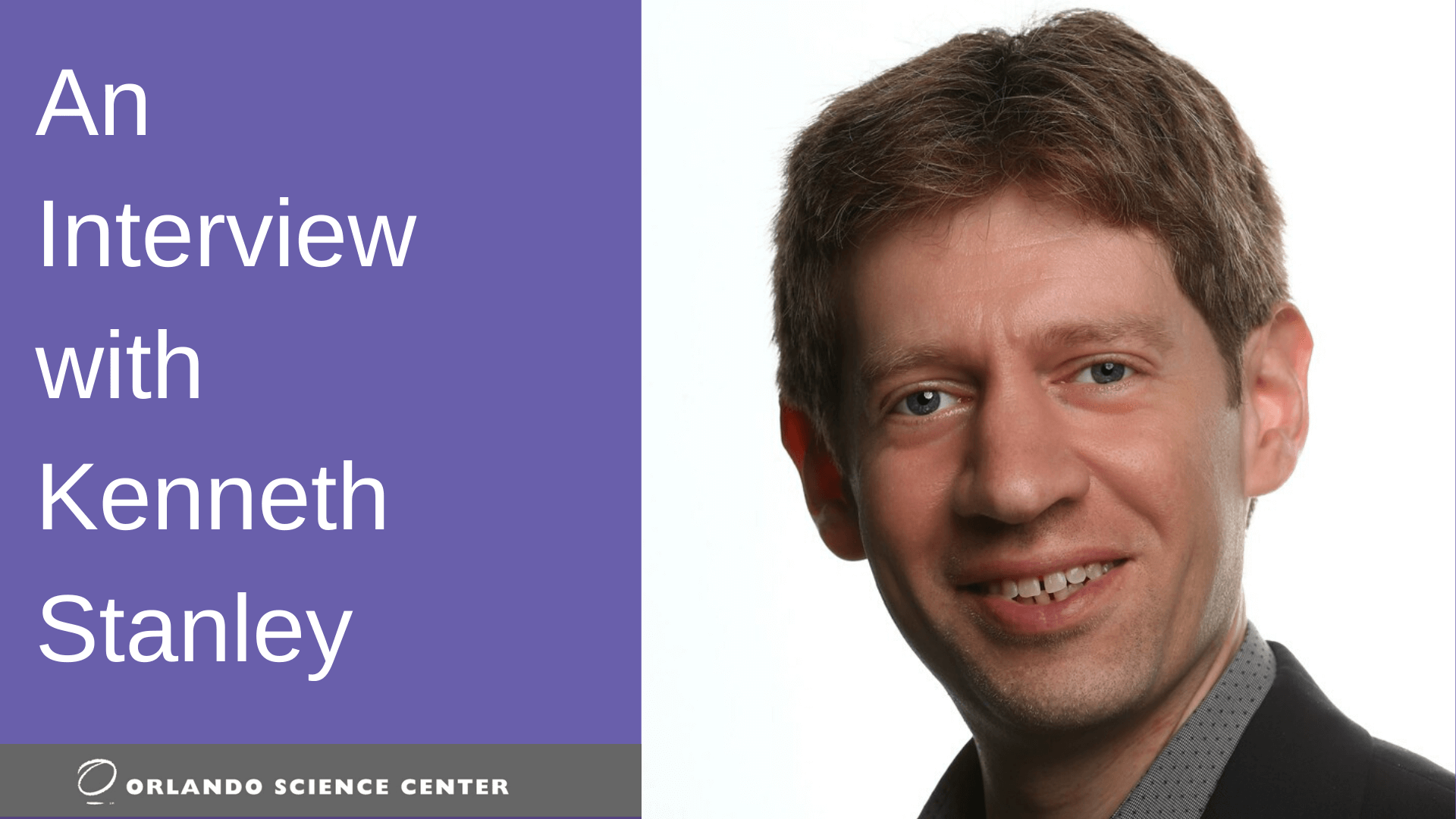Traveling Exhibit Artificial Intelligence: Your Mind and The Machine made its world premiere at Orlando Science Center this fall, and has since transformed the way many of us think about Artificial Intelligence. What we've learned is AI is actually more helpful than harmful, and is being used in spectacular ways across the world.
In an effort to continue the AI conversation, and to inspire people with an interest in a career in artificial intelligence or technology, we caught up with Kenneth Stanley, a Professor of Computer Science at the University of Central Florida and a senior research science manager and head of Core AI research at Uber AI Labs.
- How did you become first interested in artificial intelligence? I started to learn about computer programming at age 8 in a class at summer camp. I was right away fascinated with the idea that the right programming could make the computer act intelligent and creative. At first I was mainly thinking about the computer having convincing conversations with me, but over time I realized that intelligence is a broad and deep set of problems, and I became interested in intelligence and particularly creativity in general.
- What course of study did you pursue to prepare you for your career? I took computer science classes (including the AP class on computer science) at Newton South high school in Newton, MA, and then majored in computer science in college at the University of Pennsylvania. I also minored in cognitive science because I thought an understanding of human cognition would help me in trying to build AI. I went on from college to pursue a Ph.D. in computer science at the University of Texas at Austin under Professor Risto Miikkulainen, where I specialized in neural networks and evolutionary computation, which when combined is called neuroevolution.
- When did you know that you wanted to work in this field? Since about the age of 8 when I took the programming class. The idea that you could write a piece of code to make a computer intelligent immediately struck me as profound, even at such a young age.
- What has surprised you the most about your work with AI? Probably the most surprising are specific discoveries I made with my collaborators that were unexpected. Most surprising perhaps was the discovery that sometimes the best way to learn a solution to a problem is to not try to solve it. In other words, setting objectives can get in the way of achievement, counter-intuitively. This discovery was so surprising that we wrote a whole book about it called Why Greatness Cannot Be Planned.
- What’s a common misconception that people have when you tell them you work with artificial intelligence? Some people think that it means I'm good at installing software on computers, which I'm not any better at than anyone else. There is also some general misunderstanding on how far along the field is and what kinds of dangers it might present. While it does present many challenges to society, often people don't have an accurate sense of where we are along that spectrum.
- How do you see AI affecting us, specifically in Central Florida and generally as a culture? This question is discussed so often that almost everything has been said at this point about automation of services and rapid access to answers and information. Robotics is another obvious outgrowth. But I think perhaps a more interesting direction for speculation is in the opportunity for magnified creativity: can intelligent computers magnify our potential as human beings to express our creative instincts? Along with that, perhaps AI will become easier to use by non-experts, opening up its benefits, and the ability to explore its potential, to a much wider audience than is possible today.
- What’s the greatest benefit to humanity to artificial intelligence, in your opinion? I think it's too early to say. Its impact is potentially so profound that we cannot yet imagine it accurately. But one thing that I believe it can do that is at least very important if not necessarily greatest of all, is to help us understand ourselves. After all, our intelligence is the inspiration for AI, and the closer we come to something similar, the more we can understand why we are the way we are, and hopefully from that how we can be better.
About Kenneth Stanley:
Kenneth O. Stanley is a Charles Millican Professor of Computer Science at the University of Central Florida and director of the Evolutionary Complexity Research Group. He was also a co-founder of Geometric Intelligence Inc., which was acquired by Uber to create Uber AI Labs, where he is now also a senior research science manager and head of Core AI research.
He received a B.S.E. from the University of Pennsylvania in 1997 and received a Ph.D. in 2004 from the University of Texas at Austin. He is an inventor of the Neuroevolution of Augmenting Topologies (NEAT), HyperNEAT, and novelty search neuroevolution algorithms for evolving complex artificial neural networks. His main research contributions are in neuroevolution (i.e. evolving neural networks), generative and developmental systems, coevolution, machine learning for video games, interactive evolution, and open-ended evolution.
